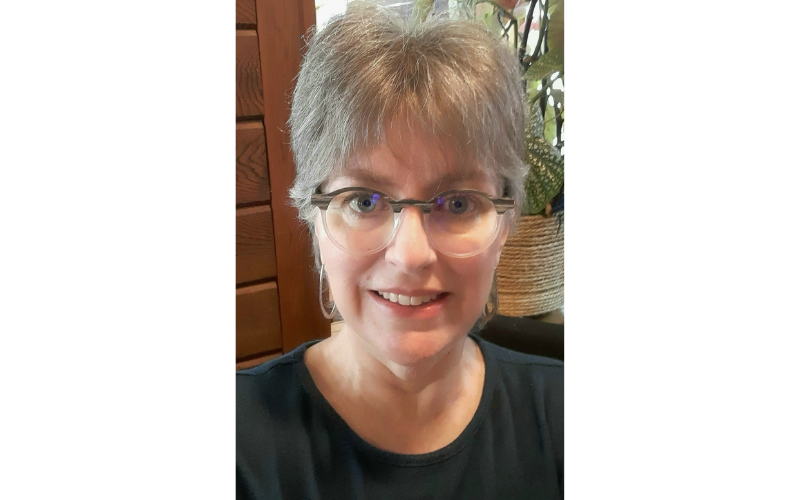Sallie Rediske and Tahlia Ruschioni presented the new medical education series at the Reflections of ME/CFS, FM, and Long COVID awareness event on May 9th. We invited Sallie to write this guest post to accompany her presentation. Click here to view the video recording.
Bio
Sallie Rediske, MPT was in private practice for 18 years prior to ME/CFS requiring her medical retirement. She was nationally board certified in women’s health physical therapy and specialized in the treatment of complex chronic conditions.
A group of physical and occupational therapists came together to establish the PT/OT Collaborative Group for ME/CFS (myalgic encephalomyelitis/chronic fatigue syndrome). Each member of our group either has or cares for someone with ME/CFS.
We established this group because physical and occupational therapists have not been informed about PEM/PESE (post-exertional malaise/post-exertional symptom exacerbation) and are unintentionally making symptoms worse for their patients who have ME/CFS and Long COVID (LC). The good news is that PTs and OTs are already trained with the appropriate skillset, enabling them to be the ideal partners for people living with ME/CFS and LC. In order to be the ideal partner they must learn about and adhere to the limitations imposed by PEM/PESE and ensure they do not push patients further into a crash cycle.
Why are OTs and PTs suited to support patients with PEM?
- They frequently spend far more time with their patients than other healthcare providers.
- They learn more about the intimate life challenges of their patients.
- They understand the setting in which their patients work.
- They focus on functional skills.
The PT and OT as respective professions developed in large part during the polio epidemics of the 20th century. They focused on supportive interventions that decreased the impact of conditions like polio on a person’s day-to-day life providing ways for patients to maintain function without exacerbating their condition.
Nowadays, focus is placed on more curative or therapeutic approaches that are progressive in frequency, duration, and intensity which is contraindicated and harmful in patients who have PEM/PESE.
It is important for providers to remember that their most fundamental “skill” is based in teaching efficient movement techniques and accurate scientific information. A physical or occupational therapist’s skill is also about helping the patient determine “dosing” on how to pace, a skill that without outside guidance can take years to hone until the individual patient masters it.
ME/CFS and LC science supports this return to the professions’ roots of supportive care for quality of life based on the unique goals and needs of the individual. This includes using modalities of treatment such as:
- education about the illness
- teaching about pacing and
- other energy conservation strategies like transfer techniques and use of assistive devices and technologies.
These are not new concepts for OTs and PTs! The only thing new is that these professionals need to be willing to learn about ME/CFS, LC, and PEM/PESE and be able to apply these tried and true rehab concepts safely in this patient population.
The new education series we developed in partnership with Bateman Horne Center is comprised of videos and hand-outs that teach PTs and OTs how to:
- identify PEM/PESE
- avoid causing PEM/PESE
- teach patients about pacing
- redefine “movement” therapy to focus on how to support activities of daily living
- provide supportive care that can improve the quality of life for their patients
In the US and Canada there are approximately 468,000 PTs/Physios/Physical therapy assistants and 158,000 OTs/occupational therapy assistants. It is important that this information be disseminated to rehabilitation providers so they can apply their foundational skills to help this underserved and mismanaged patient population.
Everyone deserves INFORMED medical care.
Bateman Horne Center and Open Medicine Foundation are partnering to educate healthcare professionals about complex chronic diseases that affect multiple systems.
We rely on charitable contributions to produce educational content such as the PT/OT Education Series. Support our work by donating today!

 Lucinda Bateman, MD, is a renowned clinician, researcher, and educator. Her Johns Hopkins University Medical School training instilled an approach to care that she has employed throughout her career - the patient comes first and the unknown or unexplained does not equate to a lack of proper and compassionate care. Since starting her own practice in 2000, she has served on six boards or committees, been the principal investigator for 45 studies, authored/coauthored 40 journal articles, served as adjunct instructor and adjunct assistant professor in the University of Utah Departments of Preventative Medicine, Internal Medicine, and Anesthesiology, and lectured around the world.
Lucinda Bateman, MD, is a renowned clinician, researcher, and educator. Her Johns Hopkins University Medical School training instilled an approach to care that she has employed throughout her career - the patient comes first and the unknown or unexplained does not equate to a lack of proper and compassionate care. Since starting her own practice in 2000, she has served on six boards or committees, been the principal investigator for 45 studies, authored/coauthored 40 journal articles, served as adjunct instructor and adjunct assistant professor in the University of Utah Departments of Preventative Medicine, Internal Medicine, and Anesthesiology, and lectured around the world.